2 Message from our department

“Growth and Change”
Dr. Don Haviland
3 Meet the Racial Equity Fellows
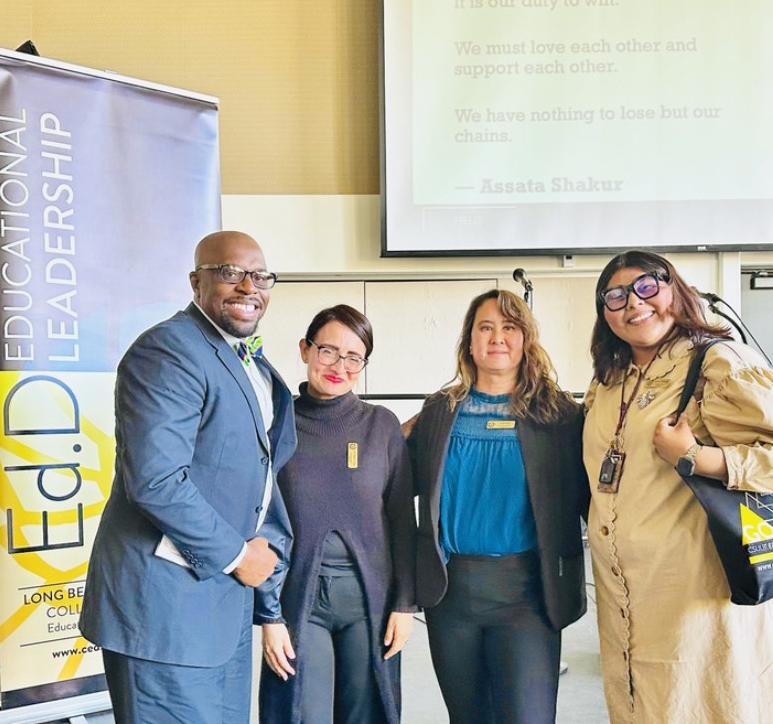
Reflections on their work this year and beyond!
for
Story starting on page 7
5 The REF Experience
The experience of being a REF and moving education into a more inclusive future.
8 A Lifetime of Learning 12 Growth and Change in EDLD
The career and life of Dr. Charles Slater as his sabbatical comes to an end.
A collage of this year and introduction to our new dean!
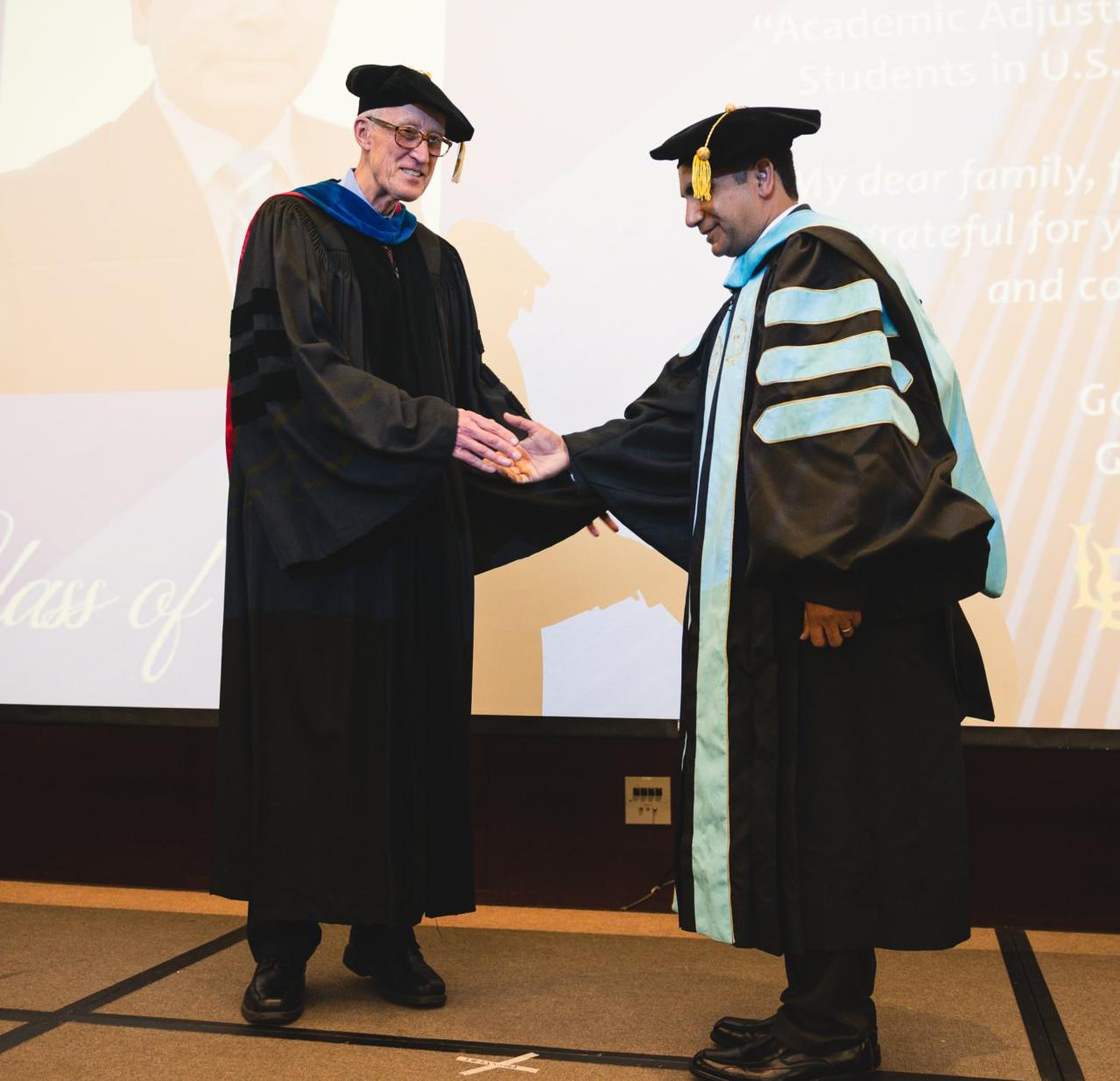
Volume
Issue 1 CALIFORNIA STATE UNIVERSITY LONG BEACH COLLEGE OF EDUCATION
VII
“I think more than anything, it’s gratefulness
these opportunities to keep learning,” Dr. Slater said. “I hope to find more ways to learn and contribute.”
Message from the Department Chair
As we continue the long road of returning to “normal” after the pandemic, I’m thrilled to draft this message for our first newsletter since 2020!
The theme of this newsletter is Growth and Change, and I cannot imagine a more appropriate theme for our first post-pandemic newsletter. The last 3 years have been filled with change; as we know well, change is not always positive. But when we pair change with growth and learning, we have the opportunity to find something positive even in the most difficult moments of change.
Dr. Don Haviland Department Chair

And I believe it is in this space of growth and change that we can find important lessons for ourselves as educational leaders. In my own experience, I have learned the most when the change happening is the most difficult or challenging; the process is usually humbling, but also always a chance for growth.
In the last 3 years alone, we’ve figured out how to lead and learn remotely, as well as how to re-open under fluid and trying conditions. We’ve learned how to serve students deeply impacted by the trauma and learning loss of the pandemic. We’ve learned how to support colleagues and staff who are tired and emotionally drained from that same trauma. And we’ve undertaken much needed work around racial equity. These times have shown our resilience and a capacity for growth we likely never imagined.
As we work to transform PK20 education, this collective capacity for growth, learning, and adaptation as leaders gives me hope. We have no more important professional challenge than working together to build just and equitable institutions that serve all students. Doing so requires our ability to innovate, to initiate challenging conversations, and to be humble about the challenges of leading change. The last several years lead me to believe we can make this change happen.
As you read through this issue, I hope you draw the same hope and energy that I do from Dr. Charles Slater as he reflects on a career filled with growth and change, and from our Racial Equity Fellows as they talk about providing leadership for conversations around racial equity in the college.
As they say in the college, Go Beach! Go Teach! And Go Lead!
Growth and Change...
2
Reflections from our Racial Equity Fellows
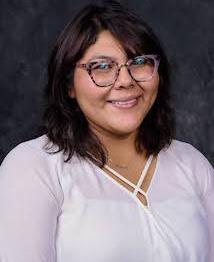
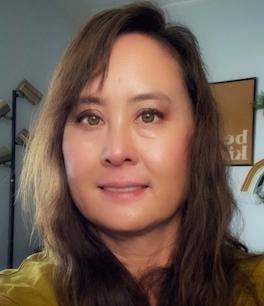
Driven by collaboration, advocacy, racial justice, equity, inclusion, and innovation while taking immense pride in providing the best version of myself to consumers, stakeholders, and partners. When reflecting upon my past 2022-2023 academic school year, cohesiveness was something that I valued from the opportunity of serving as a Racial Equity Fellow (REF). As a REF, I had the freedom to lead individually and collectively with the team which provided multiple opportunities to actively participate in the equity building process we sought to achieve. I was able to gain greater insight into myself, while discovering strengths and weaknesses when working in a team, as a member, and as a leader.

Furthermore, I was exultant about the fact that this year’s “Equity Leadership Series” provided a toolbox of actionable resources to bring forth into communities of practice. Finally, I had the opportunity to host “Allyship in Action” workshop where I was able to embark upon meaningful dialogues to discover creative ways to practice allyship. As Ally’s, the attendees were able to discover tools of action that created inclusion, accountability, as well as equity in the communities that they live and work in.
Decisions regarding education are dynamic and ever changing. As such, they should never be made in a silo, especially without tapping into the voices of our most important stakeholders, our students. Oftentimes students are talked about and spoken for, but seldom do admin and teachers listen to them.
As an educator in the K12 sector, listening to the anti-racism student panel was eye-opening, raw, and revealing. These prolific, middle school students spoke from the heart, offering educators keen advice to move the needle towards racial equity. Knowing that these young advocates will be at the helm of making change, brings much hope for our collective future.
Being selected for the REF program made my first year in my EdD program meaningful and transformative. I met brilliant and empathic leaders actively searching to make positive and equitable changes in their respective fields. I enjoyed learning how philanthropic, K-12, and higher education leaders create opportunities to help disproportionately impacted communities. One of the biggest takeaways from this experience is being able to lean on my fellow REFs and brainstorm critical topics to address for our CSULB community and beyond. Having to put together a conference that dealt with the subjects of race, sexuality, and intersectionality made our time together even more meaningful. I highly recommend this opportunity to anyone interested in putting theory into praxis. As I walk away from this program, I value the insight, knowledge, and resilience that my team members embody, and I am even more motivated to continue doing the work in spaces that I get to be a part of.
3
Johnathon Davis
Leslie Saito
Basti Lopez De La Luz
Reflections from our Racial Equity Fellows
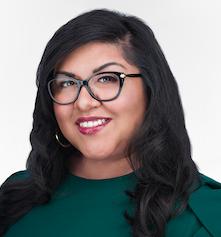
As a REF, there are many opportunities to ensure we continue to raise awareness of the critical importance of addressing inequities in school systems and dismantle practices that perpetuate harm for young people and their communities. Through this work, I felt honored to work with diverse and strong equity leaders to determine actions that could be taken to discuss and advance equity conversations and action driven practices folx could take within their contexts. Within each engagement opportunity, we determined it was important to address the following: dismantling of systems, discuss concrete items for equity implementation and direct implications for communities we serve, tools such as scenarios, lived experiences, videos and other media formats will be embedded in sessions.
These series were interactive, action oriented and dialogue driven. They will provide a toolbox of actionable resources that would be offered to attendees. Each opportunity facilitated a forum of ongoing conversations via communities of practice around 4 main topics: Identity, Leadership & Community, Leadership & Learning and the importance of Healing/ Restorative Spaces in schools.
As a REF, I led two sessions focused on racial justice and philanthropy. The topics I hoped to shed light on focused on increasing racial equity among education entrepreneurs and how the field remains predominately represented by white leaders. However, having proximate innovators, such as educators of color with big ideas for education, represented more among entrepreneurs would not only diversify the field but provide solutions that take into account how to best support underestimated students. I appreciated the opportunity to lead this conversation across two REF sessions in addition to learning from my fellow REFs through the sessions that they led. Lastly, the highlight of my experience was truly getting to know my fellow REFs, who represented current students and alumni. It was a great opportunity to stay connected to the CSULB community while expanding my circle of equity-minded colleagues.
Identity Leadership & Community Leadership & Learning
Healing & Restorative Spaces
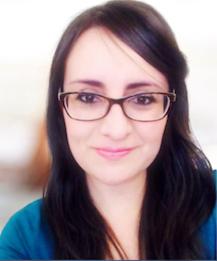 Dr. Noemi Villegas
Dr. Noemi Villegas
4
Dr. Vanessa Monterosa
The REF Experience
The Educational Leadership Racial Equity Fellow program exists to serve as a base to add an extra layer of lived experience and intentional focus on institutional racial justice. The Fellows advise the department on how to move forward and to create leaders in education to change the system.

The REFs can serve up to two years, with renewal after the first year. The fellows for the 22-23 school year were Basti Lopez de la Luz, Johnathon Davis, Leslie Saito, Dr. Noemi Villegas, and Dr. Vanessa Monterosa. Each of them led an action session tailored to their unique specializations as part of the “Equity Leadership Series”. Each session featured lived experiences, scenarios, and various media formats to discuss systemic issues and implementation for communities. The sessions were all pieces of the puzzle, from identity, leadership and community, leadership and learning, and healing and restorative spaces.
Johnathon Davis is part of Ed.D. Cohort 16, and his main workshop was Allyship in Action in the Identity section. As a Black man whose identity spans multiple margins, he led robust conversations between community leaders and stakeholders. He connected with people from all walks of life and furthered everyone’s knowledge on articulating on their behalf in education, whether it be correcting the wrongs of the past for future generations or reconstructing higher ed.
“The goal was not necessarily to have individuals agree with everything, but to understand and look at it through a different lens and to take those perspectives into account as they are navigating daily activities, work activities and family activities,” Davis said.
Davis’s largest takeaway was not only bettering his leadership skills, but learning when to step back and allow yourself to know when to step forward and benefit the systemic
5
The REF Experience
issue at hand. While Davis’s concentration was on higher ed, the REFs also wanted to widen the conversations for the new generations currently in the beginnings of their educations.
Leslie Saito is also currently an Ed.D student part of Cohort 15. She received her credential for bilingual teaching at la Universidad Iberoamericana in México City, influencing her passion for helping new teachers of color as they enter the education field. Her session was a student forum featuring six 13–14-year-olds who began an anti-racism club on their campus.
“I was blown away at the depth of their knowledge, and listening to students is extremely valuable and often overlooked,” Saito said. “Too often, students are spoken for and about, but seldom are they given a platform to share their voices.”
Saito used her opportunity to dive deep into racism and how it effects both teachers and students, as her session entangled with the identity facet of the themes. She especially enjoyed working with people she normally would not cross paths with and seeing niches play out.
Dr. Noemi Villegas conducted three sessions, parts 1 and 2 of Leadership & Learning and Healing and Growing Together. Part 1 focused on justice centered systems in schools and part 2 leaned towards practice, initiatives and people. Her third session spotlighted the power of restorative communities in schools. She graduated in Ed.D. Cohort 5, and has since worked in PK-12 educational settings to transform educational systems in service of students, communities, and colleagues at the margins.
“Decolonizing the idea of leadership is now more important than ever, as every single individual working in schools throughout our country CAN make a difference in the systems they navigate and most importantly in the lives of every young person that attends our campuses,” Dr. Villegas said.
Basti Lopez de la Luz is an Ed.D. Cohort 16 student along with Davis and Student Services Coordinator for the dual enrollment program at Santa Ana College. She worked closely with Dr. Villegas on Restorative Justice workshops, bringing in her expertise on migrant and undocumented justice. Through this collaboration, she learned and discussed how to unpack with others but also show up authentically and vulnerably to students and coworkers.
“When we were sharing our debrief, it was us realizing there’s still so much more to learn and grow because we never really stop doing that type of work,” de la Luz said.
Dr. Vanessa Monterosa is also a veteran of the Ed.D. program, graduating with Ed.D. Cohort 8. Monterosa’s skills are in the field of education tech, which leans into how education will develop in modern times– including AI and internet and its implementations for equity usage. Her two sessions fell under the Leadership and Community umbrella, and were Philanthropy as a Pathway to Change and Am I an Entrepreneur? Her current job as a Senior Associate Partner at New Schools Venture Fund gave her the skillset to teach others about philanthropy, an underrepresented topic in equity discussions.
“What I’m finding is that it’s really hard to find
6
The REF Experience
the Indigenous and Latino leaders who have these big ideas,” Dr. Monterosa said. “I know that they’re out there. I’m trying to find the best way to reach them. Through this fellowship program, I thought this a step in that direction to start building the capacity of leaders around philanthropy and a pathway for them to enact change they want to see.”
A common motif throughout all the REFs was the understanding between them and the audience regarding the topics presented. Everyone was in a space to learn and grow and open to helping make the world better for all, while presenting completely authentically.
“At the end of the day, it is all about love and that is what I saw through this whole
year,” Davis said. “Love is the center of humanity, and we are bringing love back into spaces.”
Although the 2022-23 school year is clearing for the next, their work left an imprint on the fabric of the educational leadership program. The 2023-24 theme is Race, Racism and.... All REFs from the prior year are returning for more, with the exception of de la Luz. The ellipses represent other justice issues, spanning from law and law enforcement, economics, gender, mental and physical health, education, politics and policy and more.

7
A Lifetime of Learning
Dr. Charles Slater
The only way to truly learn the operations and functions of the world is by doing. As Dr. Charles Slater nears the end of his time in the FERP (Faculty Early Retirement Program) at California State University Long Beach, he reflects on his long impactful career.

Professors are eligible for FERP after 10 years of service and reaching a certain age, they can collect their pension and begin working half time for 5 years. Dr. Slater is currently wrapping up his third year of the program, having 2 years left.
“It means that I just get to take extra time and you don’t feel the tension, the stress, the pressure,” Dr. Slater said. “But you continue to work with students and to do research and do service and participate in everything that goes on at the university.”
Dr. Slater began his journey with teaching with his time in Togo, Africa with the Peace Corps. He went into the experience with the mindset of gratitude for his life in the United States, between his parents, community and a good education. With his vast number of years in the topic of social justice behind him, he now construes his time there in a different way.
“Now I would interpret going to Togo a little differently than I did back then,” Dr. Slater said. “I started out thinking I’m going to help people, but I quickly learned that this is really a 2-way street. I’m going to learn about the people of Togo, and they may gain some things from me. but I was the real winner, because I was able to gain from them all kinds of attitudes about culture. the important things in life and to really live the adventure of being in a community.”
After his time in Togo, his career branched into the field of educational administration. He served as superintendent of schools in Brookline Massachusetts from 1982 to 1987, then in Alamo Heights, Texas from 1987 to 1995. He then felt inclined to teach at the university level due to the opportunity to immerse himself interculturally. The University of the Incarnate Word invited him to teach, which led to a professor exchange program in Mexico.
“That was a new and a fresh start for me to do something that built on my interest in educational leadership,” Dr. Slater said. “But it added Mexico as a place. and I got to know people in Mexico who are to this day friends and colleagues. From there, I was able to expand and get to know people in Costa Rica and then later in Spain.”
His time in Spain resulted in two sabbaticals: one in University of Barcelona in 2013 and the other at the University of Madrid. These two happenings broadened his depth of culture, allowing him to conduct research, interview principles and be truly absorbed into the lifestyles of the country.
“The part of teaching that interests me the most is encouraging people and really taking people who might be a little uncertain,” Dr. Slater said. “Maybe they don’t know whether they can do something or not, and kind of helping to guide them along, and showing them that indeed they can do this, and how.”
Seventeen years ago, Dr. Slater helped form the Educational Leadership doctoral program at CSULB, after successfully helping launch doctoral programs at the University of the Incarnate Word and Texas State University. The initial planning of the program began in 2006, and Slater joined in 2007, the inaugural year of Cohort 1. The
8
A Lifetime of Learning
most impactful part of his long experience with the program is chairing dissertation committees, 27 in all, helping younger students reshape the future of education to be more equitable for all.
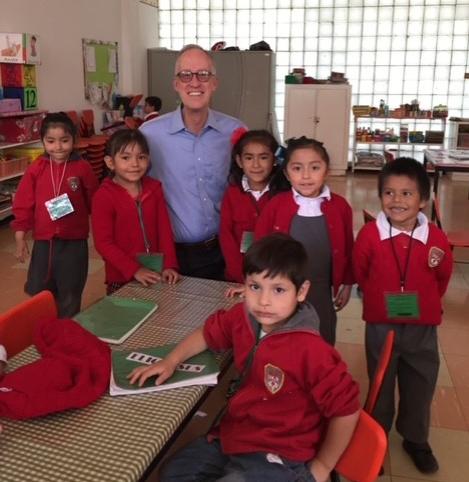
The Ed.D. program has an emphasis on social justice causing many dissertations to explore different facets of equity in education. He chaired 3 dissertations in the newly graduated Cohort 14. Phirin Salinas focused on the early childhood education of Cambodian American children, Oliver Wang centered the benefits of virtual education post-pandemic for students and Anita Chatterjee wrote on skills vital for English learners and their implementations.
He chaired two international dissertations, both being standouts. Hawani Negussie’s dissertation was on early childhood development in Ethiopia, and she went on to build a school there. The other was Fabian Rojas, a professor from Costa Rica who came to the CSULB Ed.D. program and taught at the National University of Costa Rica after. Chairing dissertations does not just abruptly end at graduation, Dr. Slater commonly presents at conferences with former students and publishes articles with them— working hand in hand.
“One of the rewarding things about a career that lasts many years is you get to know so many people,” Dr. Slater said. “You have these associations with all of these people, and the richness of it is to create a network and to connect them with another.”
Being a white man in education, Dr. Slater has had to teach himself how to incorporate racial, gender and power dynamics in the classroom as well as reevaluating his own position. He recalls a white male presenter asking him to take a backseat with asking the first question at a conference.
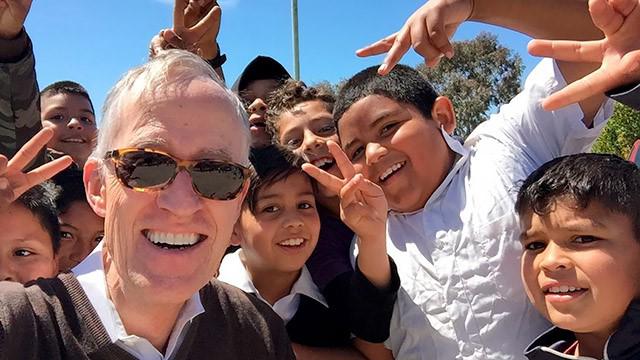
“There’s a time when it’s important to step back, but then you don’t just step back and watch what’s going on,” Dr. Slater said. “You have to really be listening to what’s going on, and to step with other people and to kind of support the things that they’re saying, to ask the kind of questions of them that will move the conversation forward. So, I think it’s a realization of a position of privilege and it’s trying to use a strategy that advances other people.”
Currently, Dr. Slater’s passion project is working on a collaboration article with Dr. Stephen Glass and Dr. Devery Rogers based on Dr. Glass’s work as a high school principal at two different schools, focusing on his experience as a Black man and helping through social justice. As for what comes post-professorship, Dr. Slater is not planning on slowing down his studies of the world. This Fall, he plans to return to Mexico and is outlining further visits after concluding teaching. He wants to continue Spanish language lessons, travel and live within other cultures and be immersed in all ways.
“I think more than anything, it’s gratefulness for these opportunities to keep learning,” Dr. Slater said. “I hope to find more ways to learn and contribute.”
9
Announcements from EDLD
New Ed.D. Jobs
Cohort 17
Congratulations to Jason Lu for becoming Interim Director of Student Engagement, Leadership and Success at Cal Poly Pomona!
Congratulations to Julia Lathin for becoming a Ceramics and AP 3D Art Teacher in LBUSD!
Congratulations to Miguel Perez for becoming Multilingual Academic Services Title III & ELD Coordinator III at LACOE!
Cohort 14
Congratulations Dr. Jason West for becoming the new Assistant Principal of Hamilton Middle School!
President’s Awards for Outstanding Faculty Achievement
20 faculty members who have demonstrated outstanding and sustained academic achievement in teaching, service, research, scholarly, and creative activity, administration, and success initiatives were selected for this award, 2 winners were from the Educational Leadership Department!
Angela Locks, Ph.D. Professor, Educational Leadership & Executive Director for Diversity, Equity, & Inclusion, Academic Affairs – College of Education
 Don Haviland, Ph.D. Professor & Department Chair, Educational Leadership – College of Education
Don Haviland, Ph.D. Professor & Department Chair, Educational Leadership – College of Education
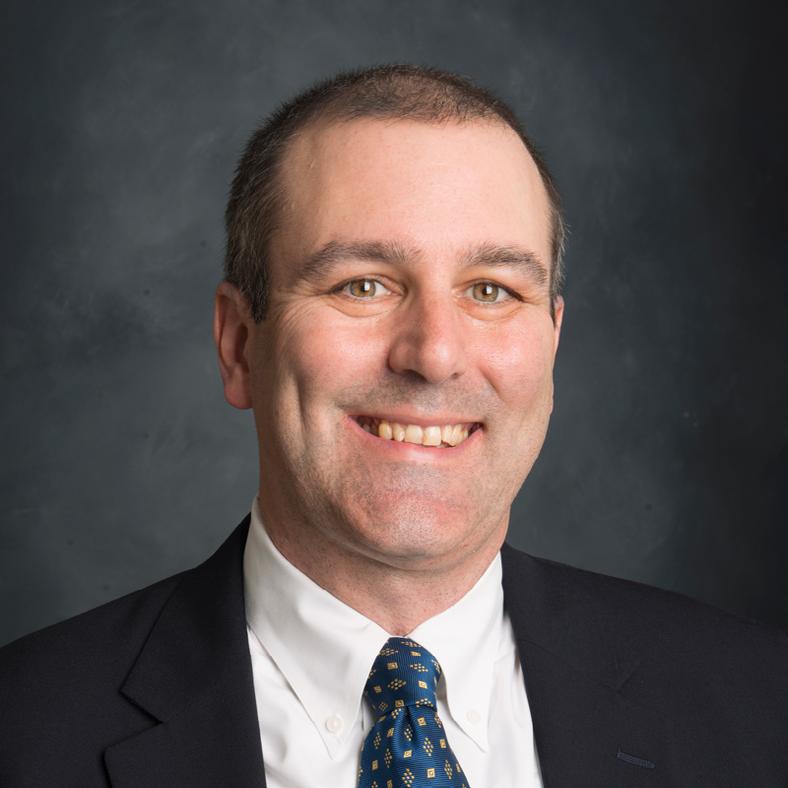
10
from EDLD


Publications and Works
The need for Black Male Mentors
Assistant Professor Dr. Devery J. Rodgers and 1st year Doctoral Educational Leadership Candidate Bobby J. Rodgers of Cohort 16 teamed up to publish an article in the April edition of Kappan. Read more here!
College of Ed professor, student honored for work supporting Black grad students
College of Education Assistant Professor Devery Rodgers and doctoral candidate Brittney Parker-Goodin received multiple awards from the Division of Student Affairs their work launching the Black Pan-African Graduate Student Organization. Read more here!
11 Oh my (Ed.D.) Baby! Congratulations to Elizabeth Casillas of Cohort 14 for her new baby girl! Zoe Amada was born on June 15th. She’s now over a month old! Reminder! Our Wine and Dine Gala is September 16th! Click here for a fun surprise! 4 p.m. @ MOLAA
Announcements
Growth and Change in EDLD






12 Read about Dr. William Vega’s induction into the American Association of Community Colleges’ Leadership Hall of Fame here! Read about our newly appointed Dean of the College of Education, Anna Ortiz, here and here! Congrats to the EDAD class of ‘23! So long and congratulations Ed.D. Cohort 14! Welcome to the new Ed.D. Cohort 17! Ed.D Cohort 16 is paving their way to change through their upcoming dissertations! Welcome to Fall semester EDLD!



EDUCATIONAL LEADERSHIP DEPARTMENT Long Beach State University 1250 Bellflower Blvd. Long Beach, CA 90840-2012 Suite AS-201 Follow us on social media! @eddcsulb @csulbedd 13 Submit to the Ed.D. Program Newsletter! To submit any announcements you would like to include in the Ed.D. Program Newsletter, please use the Call for Entries form.









 Dr. Noemi Villegas
Dr. Noemi Villegas





 Don Haviland, Ph.D. Professor & Department Chair, Educational Leadership – College of Education
Don Haviland, Ph.D. Professor & Department Chair, Educational Leadership – College of Education
















